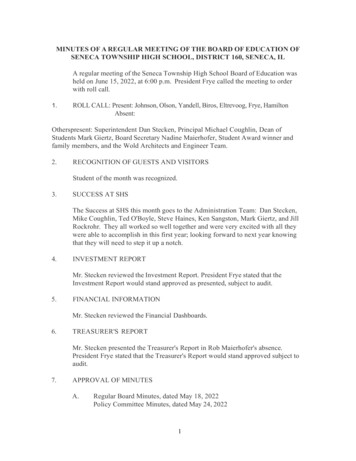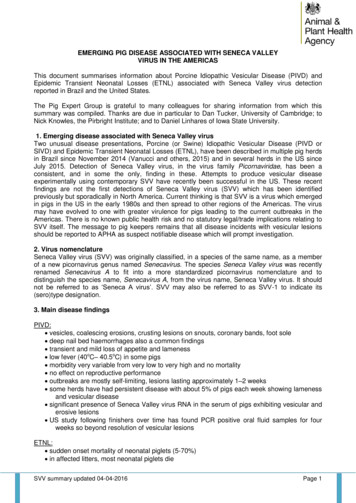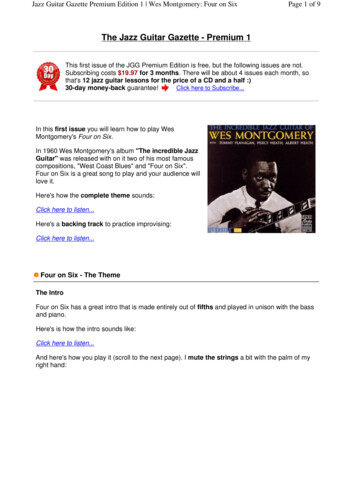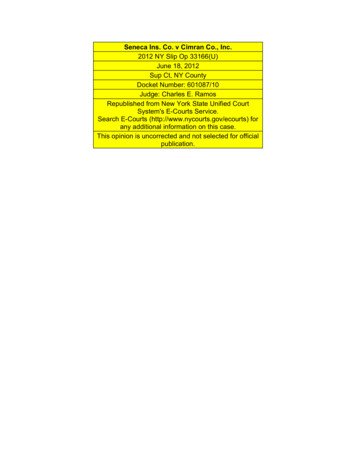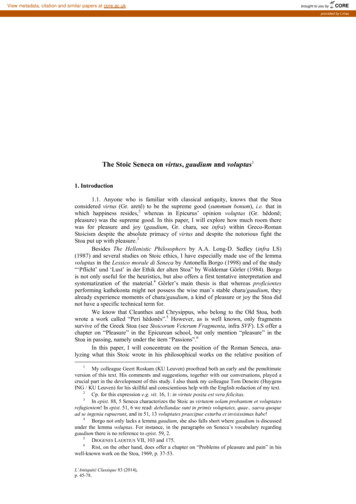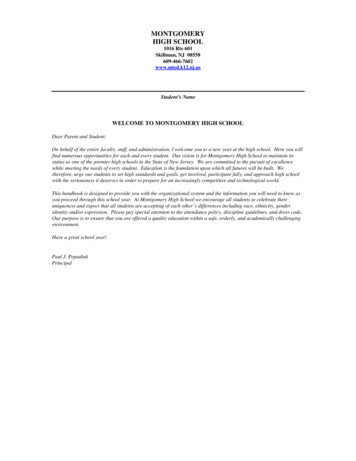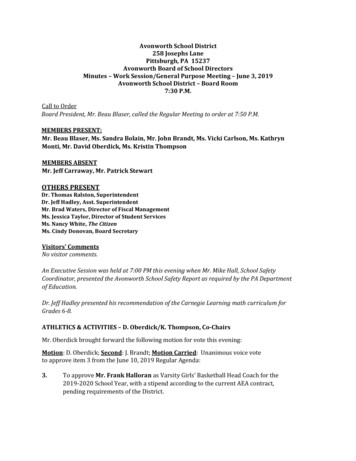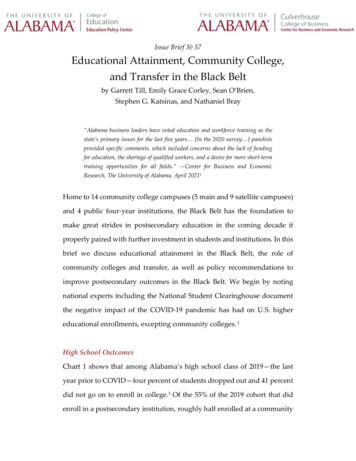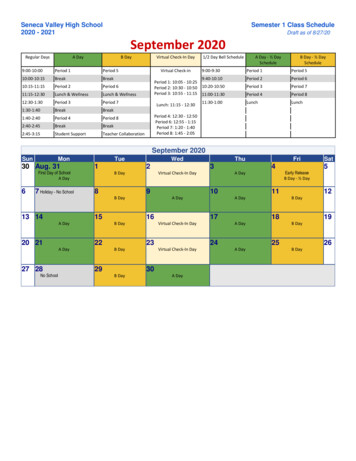
Transcription
SENECA VALLEY HIGH SCHOOL“Screaming Eagles”NJROTCNaval ScienceClassroom Policies & Procedures2018-19
2
POLICY/SVHS NJROTC15 August, 2018From: Senior Naval Science InstructorTo:Naval Science Cadets and Parents/GuardiansSubj: NAVAL SCIENCE/NJROTC CLASSROOM POLICIES AND PROCEDURES FORTHE 2018-19 SCHOOL YEAREncl: (1) Naval Science/NJROTC Program Acknowledgement Letter1. PURPOSE. To promulgate procedures and standards for all students enrolled in theNaval Science Class/NJROTC Program.2. DISCUSSION. These procedures and standards are designed to: Enhance the learning experience and classroom environment.Reinforce the teaching of self-discipline, self-confidence, teamwork, leadership,and organization.Contribute to achieving and maintaining high standards of discipline, citizenship,and self-respect demanded of students in this program.Aid cadets in developing positive personal behavior habits, characteristics andcivic responsibility.3. WEEKLY CLASS ROUTINEa. Generally, each class week will consist of the following scheduled activities:Monday :Tuesday :Wednesday:Thursday:Friday:Military Day: Drill/Leadership LabAcademic Day: Classroom InstructionMilitary Day: Uniform Inspection/DrillAcademic Day: Classroom InstructionMilitary Day: Physical Fitnessb. Cadets from Clarksburg, Damascus, Northwest and Poolesville who arrive by privatelyowned vehicle (POV) may either be driven by a parent/guardian, or may drive themselves (withvalid drivers license and parent permission). Cadets may not drive other cadets in their POV.c. All cadets entering SVHS after school hours are required to check in with the main officefirst.4. ACADEMIC REQUIREMENTS. Cadets are required to attend academic sessions,complete reading assignments/homework, independent assignments, and complete tests andquizzes on the naval science curriculum. It is each cadet’s responsibility to make-up missedcourse assignments, inspections and examinations due to excused or unexcused absences.3
5. ACADEMIC SUPPORT PLAN. Study hall, facilitated by qualified cadets, is provideddaily during lunch period. Also, NJROTC instructors are available during lunch period and afterschool to work with cadets. Additionally, NJROTC provides a website for cadets rea-five/.6. PLAGIARISM AND TEST-TAKING. The NJROTC Program is based on personalhonesty, integrity, and loyalty. Considerable importance is placed on the rules regardingplagiarism or cheating during tests and assignments.a. Plagiarism. This is defined as the taking of ideas, writing, or another individual’swork and passing it off as your own effort. A cadet is guilty of plagiarism if they copy another’swork with or without that person’s permission.b. Test-taking. During administration of tests:(1) Cadets will not communicate in any fashion. No talking, hand signals, notepassing, use of electronic devices, etc.(2) Cadets will not look at any other student’s test. “Looking” at a person’s testwill be interpreted as “reading” with the intent to cheat.c. Violations.(1) First Offense. Loss of credit for the assignment or test with no make-up,counseling by Senior Naval Science Instructor, and notification of parent/guardian.(2) Second Offense. Results in probation and referral to a school Administrator.(3) Third Offense. Cadet will be recommended for withdrawal from NJROTC.7. TARDY POLICY. Unit policy is each day cadets will be standing beside their desks whenthe late bell sounds. As per Seneca Valley HS policies, detention may be assigned if a cadet istardy to class.8. MILITARY APPEARANCE STANDARDS. It is very important every NJROTC cadetreflects favorably on the Navy’s image in our community. The U. S. Navy requires all cadets tocomply with Navy appearance standards in uniform and civilian attire as described in the “CadetField Manual” and Seneca Valley dress code policy. NO EXCEPTIONS.a. Male Cadet Appearance. In addition to the Cadet Field Manual (CFM) instructions,haircuts will be neat, clean, and present a well-groomed appearance. Bowl cuts,Mohawks, racing stripes, or extreme styles or colors are not permitted. In uniform,hair shall not extend below the front edge of the uniform cover (hat). Hair must beabove the ears and present a tapered appearance. Hair on the back of the neck mustbe tapered and may not touch the collar. Additionally, hair shall be of natural colorwithout any extreme applied dye coloring (i.e., green, purple, etc.). Sideburns shall be4
tapered and not extend below the center of the ear. Beards, full or partial, are notauthorized. Wearing of earrings, studs/rings in the ears, nose, eyebrows, tongue, lips,or other areas of the face or body normally visible is not authorized in uniform, orwhile participating in any NJROTC sponsored activity on/off campus.b. Female Cadet Appearance. In addition to the Cadet Field Manual (CFM)instructions, in uniform, hair may touch, but not fall below the lower edge of theuniform coat/blouse collar. Hair shall not extend below the front edge of the uniformcover (hat). Females shall not wear hair ornaments when in uniform. Plain pins,combs, barrettes or elastic holders must be similar in color to the cadet’s hair. Fancyfabric hair holders such as, “Scrunchies” are not authorized in uniform. Hair shall notbe colored in an extreme, unnatural color (i.e., green, purple, etc.). Only ¼ inchdiameter gold or silver ball (post type) earrings may be worn in uniform and only oneearring per ear, centered on ear lobe. Studs/rings in the nose, eyebrows, tongue, orother areas of the face or body normally visible is not authorized in uniform, or whileparticipating in NJROTC sponsored activities on/off campus.9. GRADING POLICY. NJROTC follows the grading policies of MCPS and Seneca ValleyHS. The need for an individual cadet’s reassessment will be determined by the NJROTCinstructor. Cadet performance will be assessed in the following manner:a. The total NJROTC grade is assessed in three core areas: Summative/Formative andHomework.(1) Summative: 50 % of total grade:-Academic tests and quizzes-Physical Fitness PT day includes wearing full PT gear (shirt/sweat shirt &shorts/sweat pants, sneakers) & participation.30 Pts: Full PT Gear, participates (or full PT gear with excuse note)26 Pts: ½ PT Gear (top or bottom), participates in activities24 Pts: Full PT Gear, no participation in any activities (no excuse note)23 Pts: No PT gear, participates20 Pts: No PT Gear, does not participate-Effort in class and Participation in required unit events (host drill meet & AMI)-Independent projects and reports(2) Formative: 40% of total grade:-Uniform inspections-Orders to the sentry & Chain of command knowledge-Performance of assigned duties-Demonstrated mastery of objectives5
(3) Homework: 10% of total grade:-Completion and turn in all Required 5 Forms:Cadet Information (#1)Health Risk Questionnaire (#2)MCPS Pre-Participation Physical Evaluation for Athletics (#3)Standard Release (#4)Policies & Procedures signature page (#5)b. Overall letter grades are reported as follows:ABCDE100% - 90%89% - 80%79% - 70%69% - 60%59% - 0%c. NJROTC Uniform.(1) The uniform is an integral part of the NJROTC program. Unless notedotherwise in the Plan of the Week (POW), uniform day will be each Wednesday. Cadets willwear the uniform throughout the entire school day. Cadets will not change into, or out of, theuniform at school except when changing for Phys Ed class or with permission from theinstructors on a case-by-case basis. Changing out of uniform, without prior SNSI or NSIpermission, will result in a zero grade for that day’s inspection. Cadets will wear the fulluniform properly, including covers (outdoors) going to and from school.(2) If a cadet attends school on uniform day but fails to wear the uniform, he/shemay wear the uniform the next academic day in order to make up the missed uniform inspection.The cadet will receive a 10% inspection penalty, for the make-up inspection.(3) If a cadet has an excused absence on uniform day, he/she may wear theuniform the next academic day to make up the missed uniform inspection. There will be nopenalty for excused absences.10. PHYSICAL FITNESS AND LEADERSHIP LAB REQUIREMENTS. Cadets areexpected to dress appropriately and participate in scheduled events on military days. The onlyreason for not participating in military drill, leadership labs, or athletic activities is a writtenexcuse signed by a doctor or parent/guardian. Failure to dress and participate will affect grades,eligibility for awards, promotions, and participation in NJROTC field trips, activities, and teams.a. Leadership/Team Building Exercises. Classroom discussions, class muster, Plan ofthe Week announcements, role-playing, or group work designed to facilitate and encourage thedevelopment of leadership/teamwork skills.6
b. Military Drill. Development of drill (marching) expertise includes squad drill,platoon drill, manual of arms, sword manual, guidon manual, and manual of colors.c. Athletic Activities. Cadets participate in a physical fitness program to includecalisthenics, preparation for the Physical Fitness Test, and various team sports such as soccer,basketball, kickball, touch football, team Frisbee, etc. Cadets are required to dress in issuedNavy PT gear: shirt and/or sweat shirt, shorts and/or sweat pants, and appropriatesneakers/athletic shoes.d. Sports Physical Examinations. Annually, cadets are required to complete the MCPSPRE-PARTICIPATION PHYSICAL EVALUATION FOR ATHLETES physical exam signedby a physician or nurse practitioner to participate in NJROTC Leadership/Sail Academy,Athletic meets, NJROTC Physical Fitness test, and field trips. Prior to participation in eventsrequiring a sports physical, cadets are to provide a copy of a current sports physical examinationcompleted within the last 12 months to the NSI/SNSI. NJROTC will accept sports physicalexamination forms signed by a physician or nurse practitioner such as those used by varsitysports. The Montgomery County Pre-Participation Physical Evaluation for Athletics (MCPSForm SRS-8) can be picked up at school.11. UNIFORMS AND EQUIPMENT. Protecting and maintaining government property iseveryone’s responsibility. The U.S. Navy loans all uniforms, textbooks, and equipment to eachcadet.a. Textbooks. Naval Science textbooks are issued to cadet upon request for home andclass use. Issued text books are to be returned upon completion of the school year.b. Uniforms. Complete uniforms are issued to each cadet. Each item is the student’spersonal responsibility and, if lost or negligently destroyed, a charge shall be assessed based oncurrent listed replacement costs. Uniforms will be issued during the first three weeks of school.Make sure the uniform fits comfortably before taking the uniform home. Do not accept uniformitems or shoes that don’t fit.c. Uniform Cleaning. After initial issue, the cadet assumes responsibility for the properroutine cleaning, pressing, and alterations of the uniform. The Service Dress Blue Jacket mustbe professionally dry-cleaned. All other uniform items (except shoes) can be cleaned in a washerand dryer. Detailed cleaning/laundering instructions are provided with the issued uniform.Please remember, wearing a clean, pressed and proper uniform each week accounts forapproximately 40% of the cadet’s grade.d. Uniform Tailoring/Alterations. Alterations, such as hemming slacks, are theresponsibility of the cadet. If finances are an issue, please see the Senior Naval ScienceInstructor for payment options.e. Uniform Exchanges. If a uniform item no longer fits properly or is damaged, it maybe exchanged. The cadet must first return the clean uniform item for exchange. Uniform itemswill not be issued or exchanged on a scheduled uniform day.7
f. Uniform Return. It is important to understand all uniform items must be returned orpaid for before students will be allowed to clear the class, receive completion certificates, receivetranscripts, register for future classes, or obtain their diploma. Uniforms are to be returned cleanand pressed.12. PERSONAL BEHAVIOR STANDARDS. The following standards are expected of allcadets in the NJROTC program. Failure to comply may result in disciplinary actions, removalfrom the NJROTC program, and or; loss of eligibility for awards, promotions, participation inNJROTC field trips, activities, and teams. Cadets shall:a. Follow all Seneca Valley High School rules and regulations throughout the day.Cadets lead by example.b. Call “Attention on deck!”, and assume the position of attention whenever instructors,parents, school administrators, other adults, and cadet officers enter the classroom.c. Refrain from profanity, sexual innuendo, obscene material, bullying, smoking, drugs,alcohol, and other similar types of negative activities, as they are totally unacceptable and strictlyprohibited.d. Not consume food or drink during NJROTC classes, nor chew gum in class orformation. Bottled water is permitted in class.e. Only bring non-NJROTC guests into the classroom during non-class hours withinstructor approval. Cadets are responsible for the proper behavior of their guests. Sitting ondesktops or resting feet on furniture is prohibited.f. Not leave personal items in NJROTC spaced without instructor approval. Clean up anymess you, or your guest made, especially during lunch.g. Refrain from fraternization, excessive Public Displays of Affection (PDA), boisterouslanguage, “horseplay,” and other inappropriate behavior in and around NJROTC spaces. This isespecially important when in uniform. Refrain from all PDA when in uniform.h. Meet deadlines promptly. Missing deadlines causes severe problems for the Unit andmay affect a cadet’s ability to participate in activities, quarterly grades, promotions, and/orawards.i. Always behave in a manner befitting affiliation with the U. S. Navy. Each cadet’sappearance, grooming, conduct, courtesies and manners should be a positive reflection of theNJROTC Program at Seneca Valley High School.8
13. HAZING, BULLYING AND SEXUAL HARASSMENT PREVENTIONa. Definition of Hazing. Hazing is the practice of rituals and other activities involvingharassment, abuse or humiliation often used as a way of initiating a person into agroup. Hazing is any action or situation, with or without the consent of theparticipants, which recklessly, intentionally, or unintentionally endangers the mental,physical, or academic health or safety of a student.b. Definition of Bullying. Bullying/Cyber Bullying is any type of unwanted, aggressivebehavior that involves a real or perceived power imbalance with the intent to abuse,embarrass, control, or harm the victim. Bullying can be physical, verbal or written (toinclude social media).c. Definition of Sexual Harassment. Sexual harassment is bullying of a sexual nature,which can create an intimidating, hostile, or offensive environment and is not a joke.Possessing and spreading pornographic materials, which includes nude photographs,sexting, and other sexually suggestive communications is illegal and there areconsequences both at the school level and civilian courts. A person does not have tosay something or do something of a sexual nature TO someone in particular, but it isillegal to do things of a sexual nature in school or the workplace which create anatmosphere of mistrust or fear. This may include crude language, posting ofsuggestive photographs and other similar types of things not directed at one particularperson but said or done within the cognizance of others.d. Hazing, bullying/cyber bullying and sexual harassment is not acceptable in anyform in the NJROTC program. With the proliferation of social media, moststudents are aware of bullying, hazing or harassment immediately and quite oftenknow the perpetrator and the victim. However, most bullying goes unreported.e. Reporting. You cannot and should not deal with this alone. If you are a victim,perpetrator or become aware of a cadet/student who is being hazed, bullied, orsexually harassed it is imperative you report this directly to an instructor (NSI orSNSI). The instructor will then initiate appropriate action with school administration.If you are uncomfortable speaking to an instructor, report to one of the cadet staffofficers, who will then accompany you to meet with an instructor. Failure to reportthis type of incident only makes the situation worse for the individual and possiblywill result in more negative incidents.14. NJROTC SPACES/TELEPHONESa. Classroom. Classrooms will normally be open to all cadets during lunch periods,before and after school. Scheduled meetings or work details will take precedence. The seniorcadet present is responsible to keep order, maintain cleanliness, or clear the room of students asneeded. Instructors’ desk, instruction materials, and computer/equipment are strictly off limitsto cadets.9
b. Instructor Office. The instructor office is off limits to cadets except for those withspecific official business. Cadets, no matter their rank, will knock, be recognized, and requestpermission to enter the instructor office.c. Supply, Armory, and Cadet Staff Office spaces are for official business only. Onlydepartmental and team members may be present unless asked to enter for the purpose ofconducting departmental or unit business. There will be no admittance of non NJROTC studentsin these spaces without prior permission from an instructor. These spaces are not left unsecured(unlocked) at any time.d. Telephone & Cell Phones. The NJROTC telephone is for official NJROTC businessuse only. Cadets will request permission from an instructor prior to use. Use of cell phones forall cadets coincides with Seneca Valley policies.14. ACTION. The last page, Enclosure (1), acknowledges receipt and acknowledgement of thisinformation. Ensure it is signed by both the cadet and a parent/guardian, and returned tothe Naval Science Instructor as soon as possible. It is imperative cadets and parentsunderstand the importance and necessity for these policies and procedures, and support theirimplementation and enforcement. These rules apply to all cadets, without regard to rank orposition within the Unit.Parents/guardians are welcome to contact LCDR Hernandez or the Naval Science Instructor(NSI). at 301-353-8018, E-mail: Suzan P Hernandez@mcpsmd.org . The NJROTC Plan ofthe Week is posted on the front page of the Seneca Valley web page at:www.SenecaValleyHighSchool.com. The NJROTC unit page can be accessed atAcademics/Programs/NJROTC, and check it out!S. P. HERNANDEZLieutenant Commander, U. S. Navy (Retired)Senior Naval Science InstructorSeneca Valley High School10
FORM #5NAVAL SCIENCE/NJROTC PROGRAM POLICIES ANDPROCEDURES ACKNOWLEDGEMENT LETTERDate:From: Cadet/(Print Name: Last, First, MI)To:Senior Naval Science Instructor, NJROTC Unit, Seneca Valley High SchoolSubj: ACKNOWLEDGEMENT OF NAVAL SCIENCE/NJROTC CLASSROOMPOLICIES AND PROCEDURES FOR SCHOOL YEAR 2018-191. My parent(s)/guardian(s) and I have read and fully understand the procedures and behaviorstandards set forth in the subject letter. We further understand the necessity and purpose of theseregulations.2. I promise to abide by all NJROTC Policies and Procedures to the best of my ability, or riskbeing removed from the program.Parent/Guardian SignatureNJROTC Cadet SignatureDetach and turn in this form As Soon As Possible (ASAP)Enclosure (1)11
12
NJROTC follows the grading policies of MCPS and Seneca Valley HS. The need for an individual cadet's reassessment will be determined by the NJROTC instructor. Cadet performance will be assessed in the following manner: a. The total NJROTC grade is assessed in three core areas: Summative/Formative and Homework. (1) Summative: 50 % of total grade:

